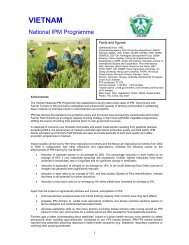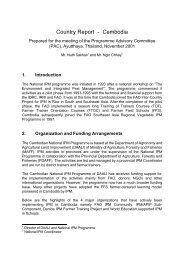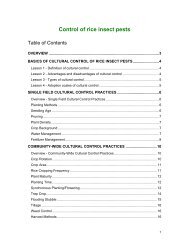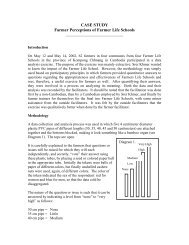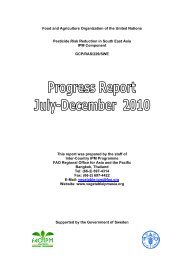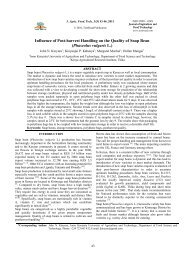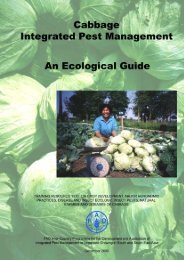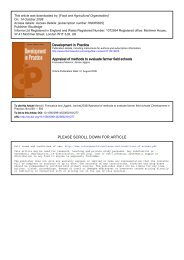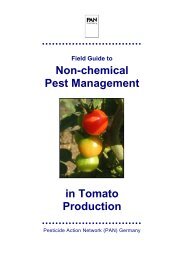Eggplant Integrated Pest Management AN ECOLOGICAL GUIDE
Eggplant Integrated Pest Management AN ECOLOGICAL GUIDE
Eggplant Integrated Pest Management AN ECOLOGICAL GUIDE
You also want an ePaper? Increase the reach of your titles
YUMPU automatically turns print PDFs into web optimized ePapers that Google loves.
___________________________________________________________________________________________Disease EcologyNo recommendations for the use of specific fungicides are given in this guide. The types, brands, dosesof fungicides differ per country and local extension agencies or departments of agriculture may havenational recommendation schedules.Calendar sprayingThe application of pesticides at regular or fixed intervals during the season is known as calendarspraying. This practice can be effective in disease control, but may lead to excessive fungicide useor poorly timed applications over the duration of the growing season, resulting in a loss of moneyfor the farmer and environmental pollution. More important, calendar spraying is not based on whatis actually happening in the field, on agro-ecosystem analysis. It does not account for presence ofnatural enemies, growth stage, weather conditions etc. Therefore, from an ecological point of view,calendar spraying should be discouraged.7.11.2 Botanical fungicidesNot much “scientific” information is available on the use of botanicals against fungaldiseases. However, in practice, farmers may use several botanical extracts tocontrol diseases.Garlic is one the more commonly used botanicals, effective both as seed treatmentfor disease control (see section 3.6.3.), and in a spray solution against fungal andbacterial diseases and insects. There are many methods to prepare garlic sprays.One of them is listed below.Garlic spray: the recipeCrush many garlic cloves with a little water, then strain this and mix with water, 1 teaspoon ofbaking soda, and 2 or 3 drops of liquid soap. Test its effect as a preventive spray against fungaland bacterial diseases and insects.Ginger (Zingiber officinale) can be used at a concentration of 20 g/l water and sprayed 3 times inintervals of 15 days. Recommended against Rhizoctonia solani, and Sclerotium rolfsii (Stoll, 2000).Onion extract is recommended against several fungi including Fusarium oxysporum. The extract isprepared as cold water extract using distilled water with 50 g onions per liter water. The plant material iscrushed in the water and then homogenized. Then it is filtered through a fine cloth and ready to beapplied (Stoll, 2000).129<strong>Eggplant</strong> Ecological Guide


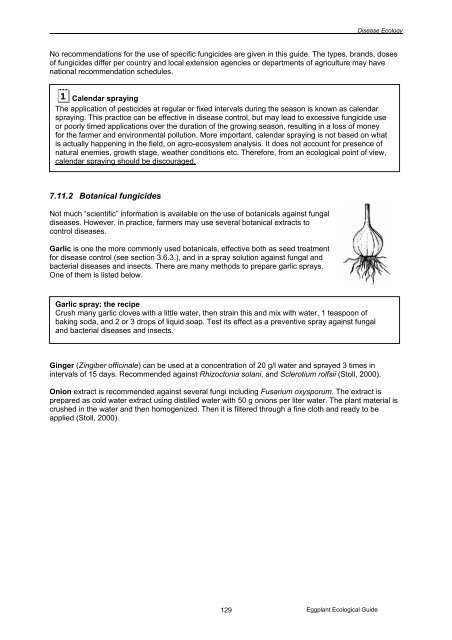
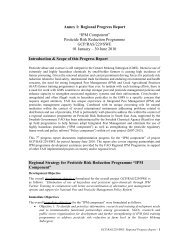
![Section 4 [ PDF file, 252 KB] - The Field Alliance](https://img.yumpu.com/51387260/1/158x260/section-4-pdf-file-252-kb-the-field-alliance.jpg?quality=85)
